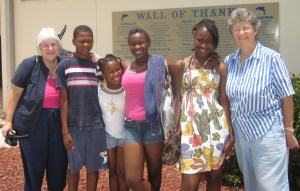 The Gospel account of the dying and raising of Lazarus (John 11:1-45) weaves the themes of friendship and death together in a poignant and prophetic way. And I can think of no more important connection in the life and ministry of Jesus or in my own life and ministry. When I am in trouble, I need my friends. And my friends turn to me when trouble is near. In addition to my lifelong and personal friends, the people I minister with and to are my friends. We turn to one another to share joy and sadness, fears and frustrations, life and death. Pastoring is from the cradle to the grave and so is true friendship. And the “being there” of friends is all the difference.
The Gospel account of the dying and raising of Lazarus (John 11:1-45) weaves the themes of friendship and death together in a poignant and prophetic way. And I can think of no more important connection in the life and ministry of Jesus or in my own life and ministry. When I am in trouble, I need my friends. And my friends turn to me when trouble is near. In addition to my lifelong and personal friends, the people I minister with and to are my friends. We turn to one another to share joy and sadness, fears and frustrations, life and death. Pastoring is from the cradle to the grave and so is true friendship. And the “being there” of friends is all the difference.
Just thirteen months ago I had to face major life threatening surgery. It was so hard to function as I moved almost robotically toward that date. Two things essential to me went on “automatic pilot”- my faith and the loving relationships in my life. I called for Jesus and I called for my other friends to be there with me. They were all there. There was a great cloud of witnesses around me, those that could be seen and those whose presence I could not see but could feel. It was their love that got me through the surgery and through a very difficult time of slow recovery. Thanks be to God, I am well and have been for many months. I could not have done this alone. I needed my friends.
My friend and neighbor is an older woman of great faith. We visit and pray in the mornings. She told me that she is at peace in her life and when God comes for her she wants to die in her bed with someone there with her. She programmed my number in her phone so I could come if needed as her children do not live nearby. She is still full of life but I pray that I can be there for her. She in turn is there for a friend in a Nursing home and for one who has had a stroke. Another friend, a woman who lives alone with her pets, just lost her beloved dog who made it to eighteen because of the love and care she poured into him. She is bereft. There is nothing I can say, but I am there for her. Dying is a time for friends. So is living. Another beloved friend of over fifty years is living in another state and facing her much loved husband’s struggles with a stage 4 cancer. I went to visit them as soon as I knew, and several times after. But, thanks be to God, he is living with cancer not dying with it and it is over two years later now. Yet we stay close and share the journey. Young or old, joys or sorrows, that’s what friends are for.
Jesus had friends in Bethany. There was Mary and Martha and Lazarus and also Simon, the Leper. Jesus visited them and taught in their homes. It must have been a great comfort to a tired itinerant preacher and teacher to have friends who welcomed him “home” and supported his ministry. Mary is described by the author of John as being the same woman who anointed Jesus with expensive perfume and dried his feet with her tears. This event at Simon’s house is also described in Mark 14 and Matthew 26 and John 11 and 12. In Luke 10:38 Martha opens her home and hospitality to Jesus and Mary sits at his feet the way disciples did. Clearly Jesus included women and lepers in his circle of friends. Jesus loved with a radical love. We recall that he shared his identity as the Messiah with a Samaritan woman and in the story of Lazarus and Mary and Martha, Martha displays her great faith in him and he discloses his identity as Messiah to her. Clearly she is his disciple and his friend. When her brother is sick she calls for her friend Jesus.
Even choosing Bethany as a place to gather his friends and disciples may be a statement of how radical his love is. In Jesus’ Aramaic language Beth Anya means “house of misery/poverty”. There is also some historical evidence in tradition and archeology and in ancient writings like that of Eusebius and others that Bethany was a place where the Essenes had a hospice, a caring home for lepers and for other poor people. So Bethany was associated with the care of the sick and the poor. Jesus chose Bethany and all of the world’s Bethanys to be with his friends, the poor and the marginalized. Jesus chose Bethany as the place to stay with friends and to teach. He chose it as the place to depart from on Palm Sunday. And it was the place that he was last seen before returning home to God. Bethany is now a West Bank Palestinian city and there is still poverty and struggle there. How blessed are we that Jesus chose to be a friend to the poor in the city of the poor and outcast.
Now let’s establish more of a context for the story of Lazarus dying. Jesus has already been stoned in Jerusalem. He got away in the crowd but his enemies are hot after him. He healed the man born blind and exposed the blindness of the religious leaders who made laws but lacked compassion and a sense of justice. He claimed that he was the Christ, the Anointed one, the Messiah. He had a large following. He was now safely outside of Judea. Yet he receives word that Lazarus is dying. He waits awhile for his own reasons that become obvious later, but he then suggests “Let’s go back to Judea” (John 11:7). The disciples try to stop him, “you were just stoned there!” But, his friends need him, he will go back to Judea.
Then Thomas makes his friendship with Jesus clear “Let us go with Jesus, so that we can die with him.” Jesus says in John 15:9 “Greater love has no one than this that he lay down his life for his friends….I call you friends….” Thomas and the disciples feel this kind of reciprocal love for Jesus although it will be very hard for them to live up to it. Jesus knows what lies ahead in Jerusalem, and still he responds to the call of his friends. In John 11:5 we learn that “Jesus loved these three very much”. He gets there in time for the funeral and for the recriminations of Mary and Martha who say “He wouldn’t have died if you were here in time”. But this is the way it is in life. We all die. Jesus will die. But something else will happen here. Jesus was deeply moved with grief, theirs and his own. He wept. “See how he loved Lazarus,” they said. He truly did. He then prays his heart out, thanks God for hearing him, and tells Lazarus to come forth from his tomb. Lazarus comes forth wrapped in the garments of death and is set free of death. Imagine the amazement and belief of the crowd now. Jesus told Martha that he was the resurrection and the life, she believed him and now everyone can believe him. Jesus and the way of love, justice and equality he teaches can be chosen by the people. But the authorities cannot let this happen. Jesus will have to give his life for his friends.
Yet, like Lazarus, he will rise. And we will rise with him. We rise from the many deaths we live in our lives. The death of hope, of motivation, of physical strength and abilities, of opportunity, of our communities and families, of relationships, of loved ones, of our friends. Through Christ we rise now and forevermore. Our Friend is right there beside us.
Even as Jesus wept for Lazarus and his other bereft friends, God must weep at the death of God’s children and friends. And God must have wept mightily at the horrifying death of God’s Beloved, Chosen One Jesus. And God raised him from the dead and he was seen by many of his friends and believers until he returned to God, sending the Holy Spirit to be with us. Ultimately God is with us and within us, we are never separated from God. But when life is hard and death and loss is real it is so good to have our Friend beside us to comfort us and raise us up.
Let us live in friendship with our loving God. Let us rise from the dead now and forever. Let us love our friends as Jesus did. Thanks be to God.
Amen.


No comments:
Post a Comment